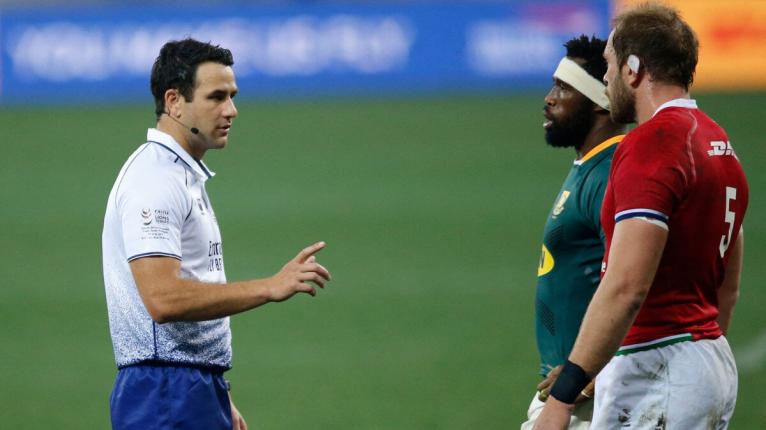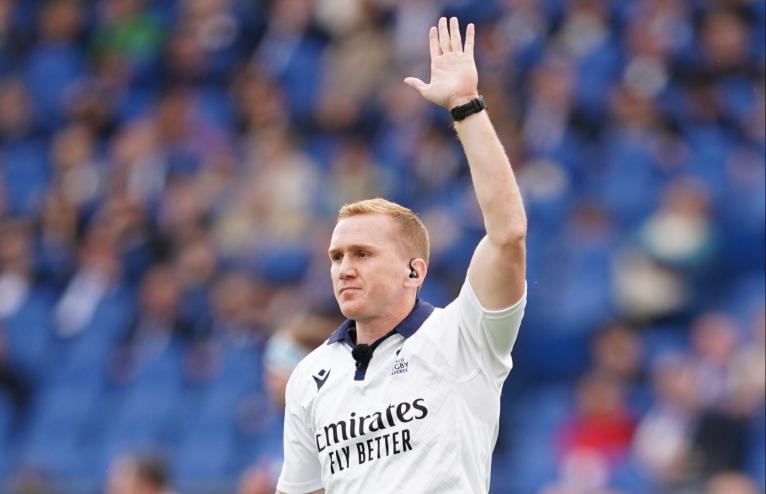Ref Watch: A tale of two refereeing performances

New Zealand’s Ben O’Keeffe caught my eye during Japan 2019 and since then he has blossomed into an outstanding referee who surely is on the 2023 final shortlist.
In particular, the 34-year-old’s ability to speak fluent French sets him apart from most of the current roster of international whistlers other than England’s Luke Pearce (who appears tomorrow).
Given that this year’s competition takes place in France and that the hosts seem likely to go deep into the tournament, having a collection of English speakers taking charge of the knock-out stages would not be a good look for World Rugby.
O’Keeffe’s commitment to being one of the world’s top referees is evident from these language skills. According to the English-born, Paris-based multi-lingual referee who helps top match officials develop language skills, the Kiwi eye surgeon has made himself into someone who merits the tag “bilingual” through a huge quantity of hard work.
Throughout rugby history French-speaking teams have had an understandable chip on their collective shoulders about facing an English-speaking team in a contest controlled by a referee who chats away in their opponent’s native tongue. You sense their whole demeanour changes when communicated with on an equal footing and should France reach this November’s Stade de France final, on this basis they will be delighted if O’Keeffe is there with them.
Communication and Management
Like Wayne Barnes, the Kiwi whistler has a presence which sets him apart from the crowd in officiating terms. His communication skills – in two languages – are outstanding, he rarely wastes a word and only interjects when needed.
The contrast was especially vivid today because of the self-inflicted issues Damon Murphy had with Italy in this area, but there is no doubt that O’Keeffe is in total control – and the players know it. At one point an off-camera and off-microphone England forward clearly said something with which O’Keeffe was unhappy and was promptly cut dead with: “I’m not going to get into a debate.”
Good Attention to Detail
O’Keeffe managed to tick off two of World Rugby’s current pet topics in the first half when he penalised lifter Kyle Sinckler for being in front of jumper Maro Itoje as a lineout became a maul then pinged Lewis Ludlam for going off his feet when pre-latched to Max Malins.
It was also interesting to see how O’Keeffe dealt with a shambolic French lineout which saw them quickly throw to the front man while their lifting pod was still stood a couple of metres away from the line of touch waiting to join. Most of us would have waved play on, but O’Keeffe correctly awarded a free kick to England since the offence related to the formation of the lineout.

Teamwork is Dreamwork
The teamwork between O’Keeffe and touch judge Jaco Peyper which saw them both ideally positioned to see Charles Ollivon reach over the breakdown and ground the ball for a try as it lay on England’s side was really impressive.
In O’Keeffe’s case the ability to read what was happening and the pace to get to the England side stood out while Peyper had the presence of mind to move ‘the wrong way’ along the touch-in-goal line to a position rarely taken by a touch judge in order to get an enhanced view.
This meant they were able to correctly call the try on-field prior to sending it to TMO Brett Cronan for confirmation.
Nice one Ben
During many years of BBC Six Nations coverage, the lack of understanding which ageing former players brought to explaining current laws in their once-a-year pundit roles was a huge source of frustration to me – and I’m sure plenty of other referees.
It is therefore refreshing to hear some of the current generation add accurate insight to the TV pictures. I thought Sam Warburton was especially good in previous seasons and this week let’s give a tip of the hat to Ben Kay.
The former Leicester lock was spot on with his explanation of Malins’ non-try early in the second half. As Ben noted, had the diving Saracen trapped the cross-kick on the ground with his chest he only required downward pressure for a try to be awarded.
However, because he tried to catch the ball, Malins then needed to retain control without separation between ball and hand from first contact until the grounding took place. When the ball escaped his clutches even though his chest subsequently applied downward pressure, under current guidelines a knock-on was correctly adjudged.
Italy v Wales
Australia’s Damon Murphy was given the dubious honour of refereeing the Six Nations wooden spoon decider in Rome – his second career outing in the Northern Hemisphere’s blue-chip tournament.
To me Murphy seemed nervous throughout the game and never completely settled, perhaps because he was over-eager to impress in World Cup year? We all react differently in this sort of situation and Murphy’s nervousness manifested itself in endless chatter.
The days when the likes of Tony Spreadbury wise-cracked their way through 80 minutes are long gone, with referees now being instructed to use verbal input sparingly for maximum impact. The issue with endless dialogue which becomes commentary is that players quickly tune out what becomes ‘white noise.’
For example, when penalising Ken Owens on the ground shortly before half-time Murphy needed only “tackler away.” Instead we heard: “You’ve got to go east to west on the ground not north to south. You’re not rolling away.”
Through frequent off-the-cuff conversations with players as lineouts formed or during breaks in play, Murphy sent the subliminal message that he was nervous and would get involved in detailed discussions with players. Inevitably, as things went against his team this led to Italy’s captain Michele Lamaro going some way beyond what is normally deemed acceptable in the frequency with which he challenged decisions and how he did it.
Italy Penalty Try claim?
After repeatedly shooting themselves in the foot by allowing the ball to bounce, missing tackles in confined space and not converting line breaks into points Italy understandably got growingly frustrated during a first half in which Wales built a 19-point lead.
This spilled over at times in their approach towards Murphy – especially after he spent an age looking at the decision not to award a penalty try following Owen Williams’ try-saving tackle on Ignacio Brex.
This tight call hinged on the referee’s interpretation of whether there was an offside line? Traditionally, as the commentators mentioned, following a tackle there had to be at least one player from each side in contact and contesting the ball for a ruck to exist which in turn created offside lines for everyone else on the field.

This changed a few years back following Italy’s clever refusal to engage in rucks with England which allowed them to subsequently mug Ben Youngs at the base. Since then, following a tackle only one player has to be on his feet over the ball for a ruck and offside line to exist and for anyone joining the breakdown to be required to arrive from their own side.
Replays showed no such rucking player here – only the tackler and the ball carrier were present – after which Brex picked up the ball and went for the line so we had no offside line. This situation therefore became open play meaning Williams could approach from any direction so his tackle was legal.
Nice one Karl
Regular readers of this column will know I have on occasions questioned English official Karl Dickson’s readiness for top-level refereeing following his accelerated promotion from Premiership player to international official.
However, he is now really growing into his new career and for a second time in this Six Nations he played a vital role in shaping a decision and ensuring the officiating team arrived at the correct outcome.
During round three Dickson stepped in from the touchline to ensure Georgian ref Nika Amashukeli showed France’s Mohamad Houas a red card rather than the yellow he was initially favouring after the prop crashed into Scotland scrum half Ben White’s head.
Two weeks later, as the team of three and TMO Joy Neville discussed Italy winger Pierre Bruno’s fend off which ended with a forearm going into the throat of tackler Wyn Jones the conversation was heading towards a sending off.
Perhaps sensing that Neville’s comment “it’s direct to the neck” hinted at red and having viewed a ‘real-time’ replay which suggested that high levels of danger were not present, Dickson made a key intervention.
“Is it a strike or a push away?” he pointedly asked Murphy, who to his credit immediately understood the point being made and downscaled to a yellow card.
As I wrote last time, this is exactly why we have a team of officials; providing the correct decision is eventually reached why worry about all four voices not being completely aligned from the first second they discuss an incident?




































































I thought the Japanese ref for the Scots v Ireland under 20s game was excellent. Decisive, clear and the game flowed well.
When a match is one sided its easy for a ref to look good. The real test is when there is little between the teams
I wouldn't insult O'Keefe by associating him in any way with the whinging, whining Barnes.